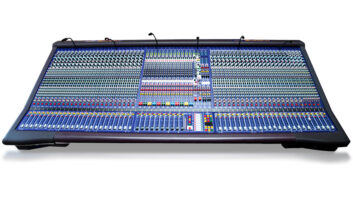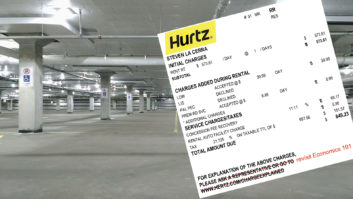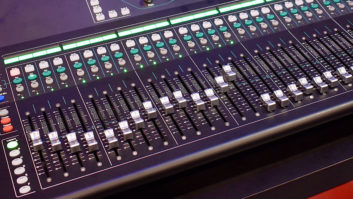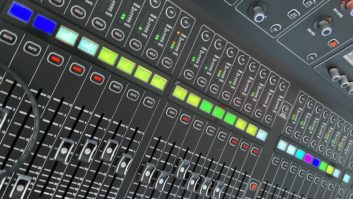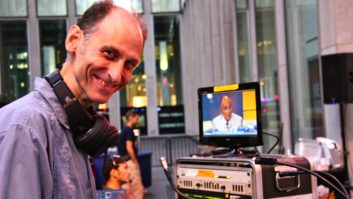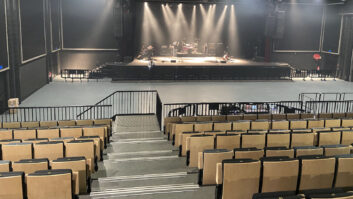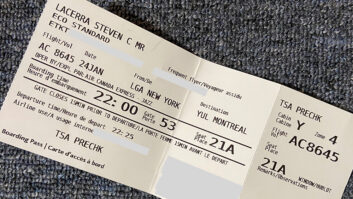Here’s a tale of two gigs that we did last week. Four hundred miles away from each other, yet light years apart. We’ll call the first one “Hell,” which was in Austin, Texas, where — if it weren’t literally as hot as hell — it was pretty close. The venue will go unnamed to protect the innocent.
Ninety-five degrees in Austin is no joke. The venue was an outdoor stage with a very low metal roof, making it about as hot as that disposable aluminum pan you use to reheat your chicken dinner. Half of the venue was under the roof and the other half was uncovered. The covered part had fans for ventilation, but they were pretty useless due to the humidity and thickness of the air. The mix position was in the outdoor area, and there was no shade for the mixing desk.
I’ve been in some situations where it was tough to read a screen in the daylight but this was brutal. Viewing the screen under cover of a towel was of no help. The house tech and I had to wait for the sun to duck down in order to see the output routing page on the console—which we desperately needed to do since we weren’t getting the correct routing from the console to the mains, subs and front fill. The fact that the screen hadn’t been wiped clean since the day it left the factory didn’t help, and while cleaning it helped marginally; we still couldn’t read a friggin word.
Read more Mix Blog Live:What’s All the Hub-bub?
During the weeks leading up to this gig, there was a lot of back and forth regarding load-in, soundcheck and show times. My crew needs at least two hours to set the stage prior to a soundcheck, so the first time the schedule came to me with a 5:30 p.m. load-in and a 6:00 p.m. soundcheck, I explained our needs to the production manager. I got back an invitation to load in at 5:00. I again explained that I needed two hours for setup. He sent back the same schedule with, “OK, we should be ready to soundcheck by 6:30.” After the third and fourth round of emails, I started getting a bit annoyed. (The PM didn’t want to advance via phone. He wanted to have an email trail of info. Instead, there was a trail of tears over wasting hours on this nonsense, which could have been sorted out in a ten-minute call.)
Finally, I get across to the guy that if we load in at 5:00, I can probably have the stage ready for soundcheck at 7:00. Doors are at 8:00, and while I really don’t care about the support act, I’m not a jerk either and want to make sure they have some time. PM comes back and says they throw and go. “Fine with me,” I reply, “but let’s be perfectly clear: this show will not run late.”
To say that the stage setup was a debacle would be an understatement. The house crew—while very pleasant and making every effort to be helpful—simply didn’t understand their own P.A. system well enough to do the gig. They decided to use a ”festival patch” in a club gig for a national act. Did I miss the part where there were four other national acts on this bill? No, I did not, so why in the heck did the stage manager do a festival patch? I suppose they didn’t get the memo that you don’t do that. Not smart. He re-patched the stage to our input list.
Meanwhile, my monitor guy was having difficulty getting any of the channels through his monitor desk. When he asked one of the audio guys if we were using the Dante (there’s that word again) network inputs or the analog inputs, he looked at us like we had three heads, not understanding the difference. We finally started our soundcheck at 8:00. Despite my best efforts, the venue opened doors—so my band had to finish their soundcheck in front of some of the patrons, which really wasn’t cool.
The next day we went to Oklahoma City—only 400 miles away—but it was like being on a different planet. Production for this gig was handled by Miller Pro Audio (emphasis on “Pro”) with Glen Mattingly at the helm. Glen and his crew were waiting for us when we arrived and went from 0 to 100 MPH in about a minute. The band was done with the first song of their soundcheck less than two hours after we loaded in. There was one audio ghost, which we suspect was due to moisture and humidity (it ultimately disappeared).
When soundcheck ended, my crew was able to relax in an air-conditioned dressing room, taking comfort in the fact that the production company had our back. Life is good.
